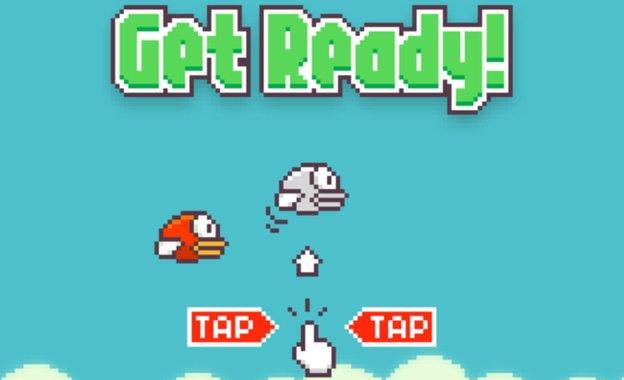The Life and death of Flappy Bird
- Published
- comments

I was late to the Flappy Bird party. I only started playing the annoyingly compulsive chart-topping game on Friday morning because we were featuring it in a discussion about the games business on our new weekly radio programme Tech Tent.
But after a couple of hours I, like members of my family, colleagues and just about everyone else, was hooked. It was the crudest game imaginable, with graphics that might have been created 25 years ago. You tap continually on the screen to keep a bird from flapping into a series of pipes. But it was the fact that it was so darned hard that made it addictive - and so lucrative for its developer.
Then on Saturday the Vietnamese inventor of the game Dong Nguyen tweeted this, external:
"I am sorry 'Flappy Bird' users, 22 hours from now, I will take 'Flappy Bird' down. I cannot take this anymore."
It wasn't clear exactly what he couldn't take any more - after all, he had earlier said he was earning $50,000 (£30,467) a day from the adverts that appeared on the free game. But by Sunday night, true to his word, he had removed Flappy Bird from the Google Play store and from Apple's App Store. If you have just heard about the game and want to play it, tough - it is now only available to the hundreds of thousands, or probably millions who've already installed it.
What can we learn from Flappy Bird's brief but brilliant trajectory across the gaming landscape? Firstly, that as the screenwriter William Goldman said about Hollywood and the movie-going public, when it comes to understanding what will make a successful game, "nobody knows anything…"
Huge businesses like EA set large teams to work with seemingly unlimited budgets to build hit games, then an unknown solo developer in Vietnam races past and heads to the top of the chart.
Nearly four years ago, I wrote about a couple of bedroom developers in Britain who had achieved similar success, but I thought the days when David could challenge Goliath in this way were over.
I notice, however, that one of the apps mentioned in that piece, The Impossible Game, is riding high in the charts again. It is almost as simple and frustrating a game as Flappy Bird, so maybe it is benefitting from a halo effect.
And maybe the recent row over the in-app purchase model - where you get a game for free and then find it totally unsatisfying until you pay for extras - has had an effect too. This article, external by Thomas Baekdal argues that in-app purchases are killing the games industry, taking sophisticated games and then trying to annoy players so much with restrictions that they will shell out to get to the next stage.
Perhaps the success of a simple ad-supported game where the only annoyance is how hard it is to get past the first pipe will inspire others to move away from the in-app purchase model. Then again, maybe not - the model is still proving hugely lucrative and for millions of new games players on smartphones and tablets, free to download then pay to make it fun is the only method they have ever known.
But maybe the main lesson we should learn from Flappy Bird is that we have seen the birth of a marketing genius. By killing the golden goose so quickly, Dong Nguyen has ensured that a huge audience will be waiting with breathless anticipation for his next game. And if that doesn't work, he can always allow Flappy Bird to fly again….